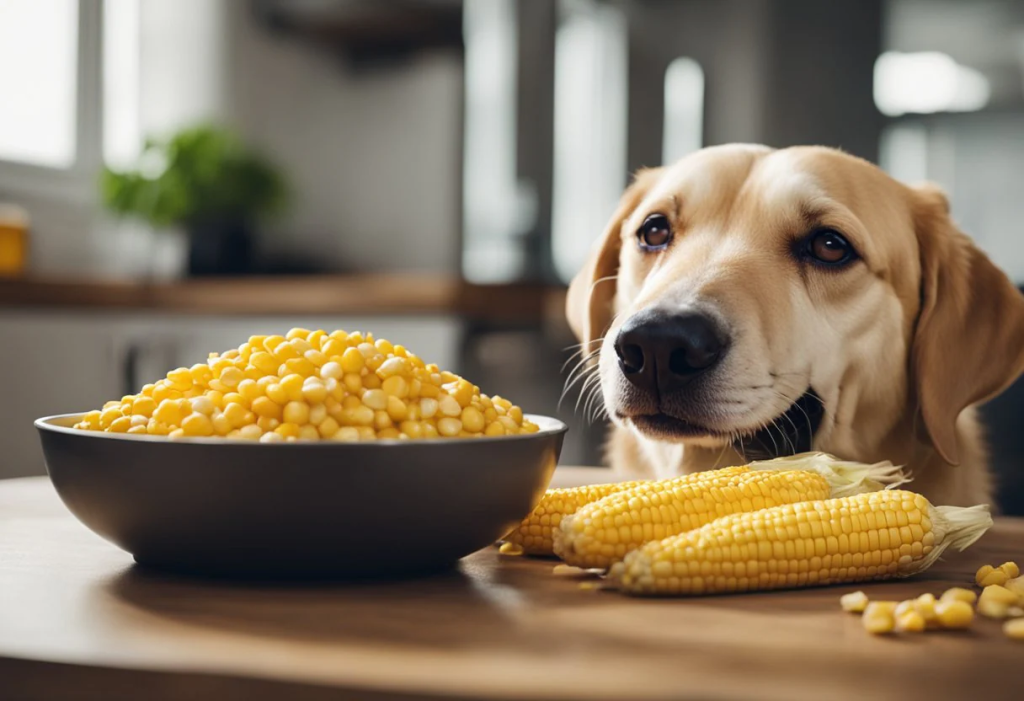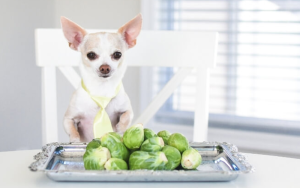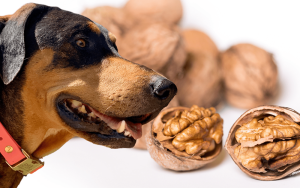Can Dogs Eat Corn? A Complete Guide to Safe Snacking for Your Pup

As pet owners, we all want to ensure our dogs are healthy and happy. Part of this involves providing them with a balanced diet that includes treats. But when it comes to human foods, you may be left wondering which are safe for your furry friend. Corn
is a commonly asked-about food when it comes to dogs. Can dogs eat corn? If so, in what form? Is it safe? These are questions that many dog owners have.
In this article, we will delve deep into whether corn is a safe and beneficial food for dogs, how it should be prepared, and the potential health risks of feeding corn to your pup. By the end, you’ll have all the information you need to make an informed
decision about whether corn belongs in your dog’s diet.
What Is Corn?
Corn, also known as maize, is a cereal grain that is widely grown around the world. It is commonly found in human diets and serves as a staple ingredient in various foods like chips, popcorn, and tortillas. Corn is packed with carbohydrates, fiber, vitamins,
and minerals, making it a popular choice for both people and pets.
However, despite its nutritional value, it’s important to understand how corn affects dogs differently from humans. While some dog foods may contain corn as a primary ingredient, others avoid it due to concerns about its digestibility and nutritional
benefits. So, before you offer your dog corn, let’s take a look at its safety and potential health benefits.
Is Corn Safe for Dogs?
Yes, corn is generally safe for dogs in moderation. Most dogs can eat small amounts of corn without any adverse effects. However, there are several factors to consider before offering your dog this food. These include the form of corn, portion size, and
the dog’s individual health conditions.
Forms of Corn Dogs Can Eat
The form in which corn is given to dogs matters a great deal. Here’s a breakdown of the various ways you might want to offer corn to your dog:
-
Corn Kernels: Fresh, cooked, or frozen corn kernels are typically safe for dogs to eat. However, ensure that the kernels are not seasoned with harmful ingredients like butter, salt, or spices, as these can upset your dog’s stomach.
-
Corn on the Cob: While corn on the cob may seem like a fun treat, it poses a choking hazard and can be difficult for dogs to digest. The cob itself is not digestible and may cause an intestinal blockage if ingested, which can
be a serious medical issue. Always remove the corn from the cob before feeding it to your dog. -
Popcorn: Plain, air-popped popcorn is safe for dogs to eat in moderation. However, avoid giving your dog popcorn with added butter, salt, or other toppings, as these can be unhealthy for them.
-
Corn-Based Dog Foods: Some commercial dog foods contain corn as an ingredient. In most cases, these are fine for your dog. However, if your dog has allergies or sensitivities to corn, it may be best to choose a food that is corn-free.
Potential Benefits of Corn for Dogs
Corn is not just a filler in dog food—when offered in appropriate amounts, it can provide several benefits:
-
Source of Carbohydrates: Corn is a rich source of carbohydrates, which provide energy for your dog. Carbohydrates are essential for a balanced diet, especially for active dogs who need extra energy.
-
Dietary Fiber: The fiber content in corn can promote healthy digestion in dogs. Fiber helps regulate bowel movements and can alleviate constipation, making it a beneficial addition to your dog’s diet in moderation.
-
Vitamins and Minerals: Corn contains several essential vitamins and minerals, including Vitamin B, folate, and magnesium, which are important for maintaining a healthy immune system, skin, and coat.
-
Antioxidants: Corn contains antioxidants like lutein and zeaxanthin, which may help protect against free radicals and promote eye health. These antioxidants can also help reduce the risk of degenerative diseases in older dogs.
Potential Risks of Feeding Corn to Dogs
While corn is safe for most dogs, there are some risks to consider before incorporating it into your dog’s diet.
1. Digestibility Issues
Not all dogs can easily digest corn. Some dogs, particularly those with sensitive stomachs or food allergies, may experience gastrointestinal upset after consuming corn. Symptoms can include diarrhea, vomiting, or bloating. If your dog has a history of
food sensitivities, it may be best to avoid corn or consult your veterinarian before adding it to their diet.
2. Allergic Reactions
Food allergies in dogs are relatively common, and corn is one of the potential allergens. Symptoms of a corn allergy include itching, ear infections, skin rashes, or gastrointestinal problems. If you suspect your dog has a corn allergy, it’s important
to discontinue feeding them corn and consult with your vet to determine a suitable diet.
3. Obesity Risk
Corn is a carbohydrate-rich food, and like all high-calorie foods, it can contribute to weight gain if fed in large amounts. Dogs that consume too many calories, whether from corn or other treats, can become overweight or obese. Always be mindful of portion
sizes when giving your dog any treat, including corn.
4. Choking Hazards
Corn on the cob presents a choking hazard for dogs. The cob is difficult to digest and can cause blockages in the digestive tract if swallowed. If you do decide to offer your dog corn on the cob, always supervise them closely and remove the kernels first.
How Much Corn Can Dogs Eat?
Corn should be treated as an occasional treat rather than a regular part of your dog’s diet. While it’s generally safe, it’s important to feed it in moderation. As a rule of thumb, treats—whether corn or other snacks—should not make up more than 10% of
your dog’s daily calorie intake. Too many treats can lead to weight gain and other health issues.
Start by offering a small amount of corn to see how your dog reacts. If they show any signs of discomfort, such as vomiting, diarrhea, or lethargy, discontinue feeding them corn and consult with your vet.
Signs That Your Dog May Be Allergic to Corn
If you’re concerned that your dog may have an allergy to corn, look out for the following signs:
- Itchy skin: Scratching, licking, or biting at the skin could indicate an allergy.
- Ear infections: Dogs with food allergies often develop frequent ear infections, which can be painful and uncomfortable.
- Gastrointestinal distress: Vomiting, diarrhea, or excessive gas may suggest that your dog’s stomach is sensitive to corn.
- Inflammation or redness: Allergic reactions can cause skin inflammation, especially around the face and paws.
If you notice any of these symptoms, it’s best to eliminate corn from your dog’s diet and consult with your veterinarian to confirm if it’s the cause of the allergic reaction.
Alternatives to Corn for Dogs
If you’re looking for other healthy snacks to offer your dog, there are plenty of options to choose from. Some dog-friendly alternatives to corn include:
- Sweet Potatoes: Rich in fiber and vitamins, sweet potatoes are an excellent choice for dogs.
- Carrots: Low in calories but high in vitamins, carrots make a crunchy, healthy treat for dogs.
- Pumpkin: Packed with fiber and vitamins, pumpkin is great for digestive health and can help with constipation.
- Apples: A good source of fiber and vitamin C, apples are safe for dogs, but be sure to remove the seeds and core.
Conclusion: Can Dogs Eat Corn?
In summary, corn can be a safe and nutritious treat for most dogs when fed in moderation. It provides essential nutrients like fiber, carbohydrates, and vitamins, making it a beneficial snack for your dog. However, corn should always be served in a safe
form—preferably as kernels or plain popcorn—and never on the cob, which can pose serious health risks.
Before introducing corn into your dog’s diet, be aware of any allergies or sensitivities they may have. Always consult your veterinarian if you’re unsure whether corn is suitable for your dog, particularly if your pet has a history of food allergies or
digestive issues.
By understanding the potential benefits and risks, you can make an informed decision about whether corn is right for your dog. Just remember: moderation is key, and treats should never replace a balanced, nutritious diet designed specifically for your
pet’s needs.
Frequently Asked Questions (FAQs)
-
Can dogs eat corn chips or corn snacks?No, corn chips and other corn-based snacks are typically unhealthy for dogs due to their high salt and fat content. These snacks can cause stomach upset, obesity, and other health issues.
-
What is the best way to serve corn to my dog?The best way to serve corn to your dog is by offering cooked corn kernels without any added butter, salt, or seasoning. Avoid giving your dog corn on the cob to prevent choking hazards.
-
How do I know if my dog is allergic to corn?If your dog experiences symptoms like itching, ear infections, or gastrointestinal upset after eating corn, it may be allergic. Consult your veterinarian for a proper diagnosis and dietary
recommendations. -
Can corn help with my dog’s digestion?Yes, the fiber in corn can aid digestion and help regulate bowel movements, making it a good option for dogs with occasional constipation.
Remember to always consult with your veterinarian before making significant changes to your dog’s diet to ensure the best outcomes for their health and well-being.






